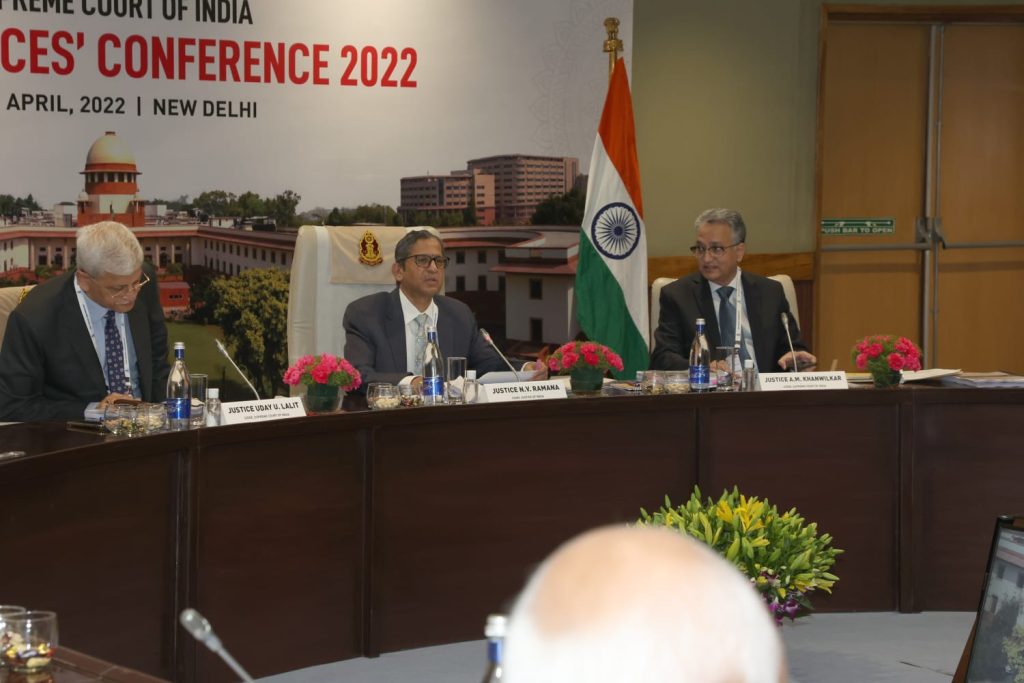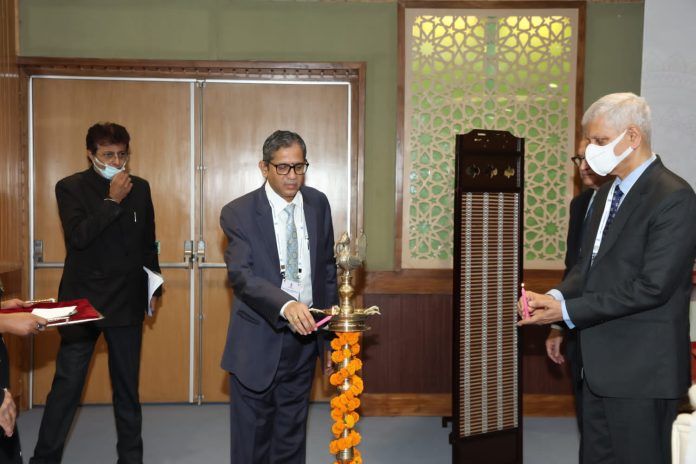Chief Justice of India N.V. Ramana on Friday chaired the 39th Conference of Chief Justices of High Courts.
Speaking during the Conference, which was held t the Supreme Court premises, Justice Ramana said, “Due to our collective efforts, we could fill 126 HC vacancies in less than a year.”

“You may recall that one of my first communication to you was about the filling up of vacancies. I have also requested all of you, in our very first online interaction, to expedite the process of recommending names for elevation to High Courts, with an emphasis on social diversity.
“I am happy to note that the response from some of the High Courts has been extremely encouraging. Due to our collective efforts, we could fill 126 vacancies in various High Courts, in less than an year. We are expecting 50 more appointments. This remarkable feat could be achieved because of your wholehearted co-operation and commitment to the institution.
“I request the Chief Justices of High Courts, which are still having number of vacancies, to forward the names for elevation at the earliest.

In the past one year, we have got nine new judges to the Supreme Court and 10 new Chief Justice for High Courts. I thank my Brothers in the Collegium for their cooperation.
I am looking forward to a fruitful and productive discussion today on all the agenda items. My Brothers Justice Lalit and Justice Khanwilkar will guide us through these discussions.
All of you have rich experience of more than ten years as Judges. You will be able to analyse the subjects objectively and make constructive suggestions. With your free and frank views on the subjects being discussed, we will certainly be able to arrive at meaningful conclusions.
Our conclusions and resolutions from today will form the basis of deliberations in the Joint Conference tomorrow. We will take these up with the Government, and attempt to build consensus around the same.
“The aim and object of today’s conference is to discuss and identify the problems that are affecting the administration of justice.
Also Read: Three more accused move to Mumbai Court for discharge in Bhima Koregaon case
Today, in addition to taking stock of the progress made in implementation of the resolutions adopted six years ago, we will also be taking up discussion on the following 6 agenda items:
- Strengthening of IT infrastructure and connectivity at all court complexes pan India on priority basis,
- Human Resources / Personnel Policy – Needs of district courts,
- Infrastructure and capacity building: Institutionalising the mechanism for augmenting and creating state-of-the-art judicial infrastructure,
- Institutional and legal reforms,
- Appointment of High Court Judges,
- Emoluments of High Court Judges and augmenting post retiral benefits of High Court Judges,” he concluded.

The Chief Justices’ Conference was attended by, among others, Justice Uday Umesh Lalit and Justice A.M. Khanwilkar, senior-most Judges of the Apex Court, along with all the Chief Justices/Acting Chief Justices of High Courts.
The Chief Justices’ Conference was first held in November, 1953, while the 38th conference was held in 2016.
This will be followed on the next day (April 30) by the Joint Conference of Chief Ministers and Chief Justices, to be held at Vigyan Bhawan, New Delhi.
Also Read: Calcutta High Court dismisses PIL alleging irregularities in National Inviting Tender for plantation
This Joint Conference, which will take place on Saturday, will be inaugurated by Prime Minister Narendra Modi, said a statement issued by the Supreme Court Registry.
Both the Conferences are being held after a gap of six years.
The ‘Chief Justice Conference-2022′ aims to address and resolve the issues concerning judiciary and shall review the progress made on the Resolutions passed in the previous Chief Justices’ Conference-2016 and also consider further steps that need to be taken to improve the justice delivery system in the country, said the statement
It further said that the Conference will deliberate on the issues of infrastructure and capacity building, with special focus on development of IT infrastructure in Courts, human resources, institutional and legal reforms, Appointment of High Court Judges etc.
Another agenda of the conference will be to delve upon the issues governing the establishment of National Judicial Infrastructure Authority and State Judicial Infrastructure Authorities as Special Purpose Vehicles at the Central and State levels for development of Infrastructure in District Courts.
It will further deliberate on ‘Institutionalisation of pre-litigation mediation and setting up of a robust mechanism for ADR’, among others.
While hearing a PIL seeking improvement of judicial infrastructure last week, CJI Ramana had remarked that the issue will be disucssed during the CJ-CM conference.


